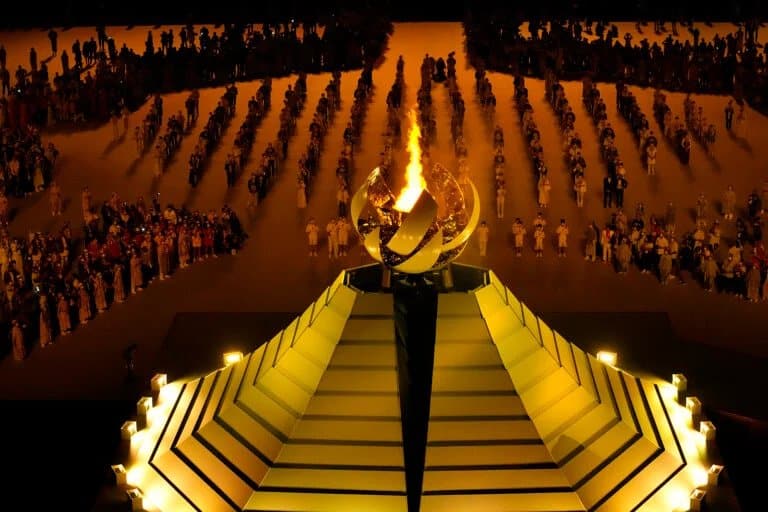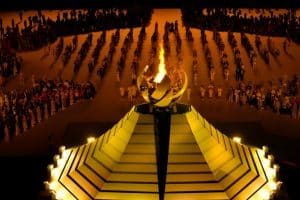
(RNS) — It’s been dubbed the first “no-fun” Olympics.
Athletes have been asked to eat alone and maintain distance in the dining hall at the Olympic Village in Tokyo, and compete in empty stadiums. Even chaplains looking after athletes’ spiritual health largely have gone virtual.

The Olympic flame burns during the opening ceremony in the Olympic Stadium at the 2020 Summer Olympics, on July 23, 2021, in Tokyo, Japan. (Lee Jin-man/Associated Press)
Amid the changes at the Tokyo Olympics — which kicked off Friday (July 23) after a yearlong delay caused by the COVID-19 pandemic, still devastating many participating countries — are adjustments to the way the Games are accommodating athletes’ religious needs, as well as to the way outside groups are able to share their faith with Olympians and their fans. Those changes come as Japan declares a fourth state of emergency in the Tokyo area as COVID-19 infections continue to climb there.
Will Thompson, Japan director for the Fellowship of Christian Athletes, explained why those accommodations are important for athletes, who he said are “created as physical, mental, and spiritual beings.”
“When failure, injury, disappointment, or unfulfillment comes, there is rarely appropriate support for these athletes to truly relate to them in a way that fully ministers to them,” Thompson said, “not a fan or asking anything of them as they so often experience. To meet them as they are, where they are, as a fellow human in need of spiritual encouragement and direction, is very important, and can greatly impact their lives on and off the field of competition.”
At the last Summer Olympics, in Rio de Janeiro in 2016, the Olympic Village featured a multifaith center with chaplains and prayer spaces representing Christianity, Islam, Hinduism, Buddhism and Judaism. Tokyo’s Olympic Village also will include a multifaith center, the Tokyo 2020 International Communications Team confirmed.
“The Villages will include a multi-faith centre to provide athletes with suitable facilities for religious services and prayers,” it said in a statement provided to Religion News Service. “Tokyo 2020 is liaising with the local faith and religious groups for planning and resourcing the multi-faith centre.”
But accommodations provided by the center will look different from those in past Olympic years in order to reduce the risk of COVID-19 transmission. Religious services for residents of the Olympic Village will be provided virtually, the International Olympic Committee’s Media Relations Team confirmed in an email.
So will chaplaincy, said Thompson of the FCA. The organization previously has supported and shared the stories of Christian athletes and coaches competing in the Olympic Games.
“While there is still a small handful of accredited chaplains, they can only enter the Olympic village for an emergency due to COVID restrictions. All chaplaincy this year is virtual — through Zoom one-on-one appointments when requested, Zoom worship services, and prerecorded devotional messages in multiple languages and traditions made available to the athletes,” Thompson said.
Tokyo 2020’s Organizing Committee also is preparing a list of religious or faith centers that residents of the Olympic Village can contact or visit and installing multifaith prayer spaces in the Games’ venues, according to its communications team.
Last year, a Japanese organization named the Yasu Project announced plans to park its “Mobile Mosque,” a truck modified to provide space for Muslims’ five daily prayers, outside Olympic venues during the Games, according to Reuters. It was not immediately clear if the pandemic had changed those plans.
More recently, the Catholic Archdiocese of Tokyo announced last week that — amid the state of emergency — it was banning visitors from its churches and canceling plans to address the spiritual needs of the athletes, support staff and fans traveling to the area for the Olympics. It reportedly will make livestreams of Sunday Masses and other devotional videos available to Catholic athletes in multiple languages instead.
Outreach during the Tokyo Olympics also will look different for Christian ministries accustomed to evangelizing among Olympic spectators and athletes alike. These groups have developed resources and activities to share with people on the streets of Tokyo and other locations in Japan since pandemic limitations have restricted them from Olympic venues.
The International Mission Board of the Southern Baptist Convention, as well as the FCA, has emphasized ahead of the Games that, as an IMB video declares, “the Japanese are the second-largest unreached people group.” About 48% of Japanese people are Shinto, 46% are Buddhist and 1% are Christians, the U.S. State Department has reported.
Scott Bradford, a Southern Baptist missionary in Japan, said the IMB’s approach has become “strategy-driven, not event-driven” in light of the inability to enter Olympic venues. The group is distributing an Olympic-themed booklet that tells the story of early 20th century Olympian track and field star Eric Liddell, a Christian who refused to compete on Sundays. The son of Scottish missionaries who worked in China, Liddell was featured as a character in the Oscar-winning 1981 movie “Chariots of Fire.”
Within the booklet are QR codes that point readers to information about becoming Christians and to invitations to follow-up events the missionaries plan to host after the Games conclude. Bradford and other missionaries are offering free “5-Minute English” sessions at locations with high pedestrian traffic in hopes of briefly helping Japanese people entering and exiting train stations practice their conversation skills with English speakers.
They also are passing out Olympic pins and Christian manga. Manga, a popular comic book art form that originated in Japan, was featured prominently in the opening ceremonies of the Olympics.
Thompson, the FCA’s Japan director, said “pin trading is a big deal in the Olympic culture,” but his organization has limited the production of its set of three Olympic pins that display the words faith, hope, and love from a verse in the New Testament’s First Letter to the Corinthians.
“We are hoping that the pins that were made will still be utilized for Gospel conversations during and after the Olympic and Paralympic time,” he said.
His organization also has partnered with Biblica (formerly the International Bible Society) to produce a “Japanese Sports Bible” and printed 20,000 copies.
“The pandemic has changed our distribution methods and plans, as we usually work with athletes coming from abroad to do sports clinics, camps, and different events as a catalyst for distribution,” Thompson said. “We are working with various churches, mission organizations, and individuals to distribute this resource to Japanese coaches and athletes.”






